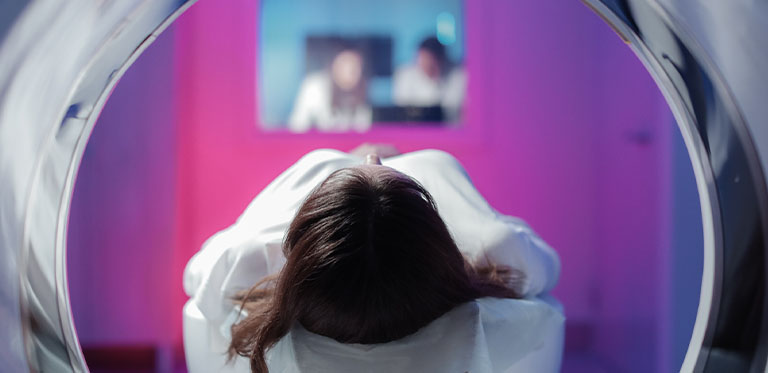What to Expect
Before scheduling or arriving for your exam
Because MRI uses powerful magnets, the presence of metal in your body can be a safety hazard if attracted to the magnet. Even if not attracted to the magnet, metal objects can distort the MRI image. Before having an MRI, you'll likely complete a questionnaire that includes whether you have metal or electronic devices in your body.
Unless the device you have is certified as MRI safe, you might not be able to have an MRI.
Devices include:
- Metallic joint prostheses
- Artificial heart valves
- An implantable heart defibrillator
- Implanted drug infusion pumps
- Implanted nerve stimulators
- A pacemaker
- Metal clips
- Metal pins, screws, plates, stents or surgical staples
- Cochlear implants
- A bullet, shrapnel or any other type of metal fragment
- Intrauterine device
If you have tattoos or permanent makeup, ask your doctor whether they might affect your MRI. Some of the darker inks contain metal.
Before you schedule an MRI, tell your doctor if you think you're pregnant. The effects of magnetic fields on fetuses aren't well understood. Your doctor might recommend an alternative exam or postpone the MRI. Also tell your doctor if you're breast-feeding, especially if you're to receive contrast material during the procedure.
It's also important to discuss kidney or liver problems with your doctor and the technologist, because problems with these organs might limit the use of injected contrast agents during your scan.
Before an MRI exam, eat normally and continue to take your usual medications, unless otherwise instructed. You will typically be asked to change into a gown and to remove things that might affect the magnetic imaging, such as:
- Jewelry
- Hairpins
- Eyeglasses
- Watches
- Wigs
- Dentures
- Hearing aids
- Underwire bras
- Cosmetics that contain metal particles
During the Exam
The MRI machine looks like a long narrow tube that has both ends open. You lie down on a movable table that slides into the opening of the tube. A technologist monitors you from another room. You can talk with the person by microphone.
If you have a fear of enclosed spaces (claustrophobia), you might consider requesting a drug from the ordering doctor to help you feel sleepy and less anxious. Most people get through the exam without difficulty.
The MRI machine creates a strong magnetic field around you, and radio waves are directed at your body. The procedure is painless. You don't feel the magnetic field or radio waves, and there are no moving parts around you.
During the MRI scan, the internal part of the magnet produces repetitive tapping, thumping and other noises. You might be given earplugs to help block the noise.
In some cases, a contrast material, typically gadolinium will be injected through an intravenous (IV) line into a vein in your hand or arm. The contrast material enhances certain details. Gadolinium rarely causes allergic reactions.
An MRI can last anywhere from 15 minutes to more than an hour. You must hold still because movement can blur the resulting images.
Results
Brighton’s board-certified radiologist studies your MRI and provides the results to your doctor.

